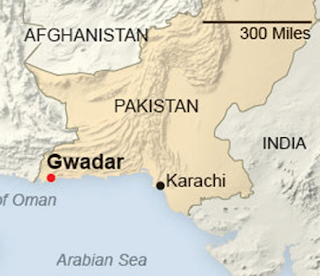Fourteen Killed in Bus Massacre in Pakistan
Terrorism has been an ongoing part of daily life in Pakistan ever since the 9/11 attacks. For decades radicalism has built up in the country to the point that violent attacks are occurring throughout the country. It is estimated that ever since 9/11, over 50,000 Pakistanis have died from terrorist attacks and over a million have been internally displaced in various areas of the nation where insurgency is particularly strong. There is no shortage of the number of targets chosen by terrorists. In May 2010, 86 Ahmadi Muslims & one Christians was slaughtered by Taliban insurgents in Lahore, the reason being that the Taliban & other Orthodox Sunni Muslims consider the Ahamdis "infidels." These same insurgents target Christians for the same reason, bombing churches throughout the nation, the most recent attack being in Quetta where a suicide bomber attacked the Bethel Memorial Methodist Church, killing 9 Christians and injuring dozens more. Just one week ago, in April of 2019, another bomb blast detonated in Quetta, Pakistan. This one killed 21 people who are members of the Hazara ethnic group of the region. The reason they were targeted? They were Shiite Muslims.
This recent attack was not a bombing, but a bus massacre, which also has sadly become a recurring theme in Pakistan. Ahmadi Human Rights activist Qasim Rashid stated that it was a favored tactic of the Taliban and other radicals to stop buses and check passengers for the ID cards. Each passenger in Pakistan carries an ID that identifies their faith and whether or not they're in the military. If the passenger is of an unfavorable faith or position, they're marked for death. In August of 2012 the Taliban stopped a bus in the Mansehra District and checked the ID's of each passenger.
Those with ID's marked as "Shiite Muslims" were pulled off and executed. This particular massacre appears not to have been a targeted attack on a particular religious group, but an attack on Pakistani soldiers. This bus was traveling in what is called the Balochistan district from the city of Gwadar to Karachi, along the Arabian Sea.
Over the years, Balochistan, one of the more remote regions of Pakistan, has become a haven for terrorists and Baloch separatists forces. In this particular massacre, a separatist group known as Raji Aajoi Sangar claimed responsibility for the attack. The 14 killed were identified as members of the Pakistani Navy or Coast Guard by the separatist members of militants who pulled them off, took them to another location, and executed them. The insurgents left the rest of the passengers were left to go on their way. These kinds of "bus massacres," which are also dubbed "checkpoint killings" have been a recurring theme in Middle East conflicts.
Lebanese Civil War survivor Brigitte Gabriel state that during the war, armed insurgents would stop citizens and demand to see their ID's. Those who were marked "Christian" were killed. ISIS has likewise committed similar "Checkpoint Bus Massacres" in Egypt, and Al-Shabaab insurgents from Somalia have done similar attacks in Kenya. This recent massacre shows that nobody is safe in Kenya. Insurgency has affected every region of Pakistan, and anyone who's ID identifies him as the "wrong kind of person" could be marked for death at anytime.
Sources:
This recent attack was not a bombing, but a bus massacre, which also has sadly become a recurring theme in Pakistan. Ahmadi Human Rights activist Qasim Rashid stated that it was a favored tactic of the Taliban and other radicals to stop buses and check passengers for the ID cards. Each passenger in Pakistan carries an ID that identifies their faith and whether or not they're in the military. If the passenger is of an unfavorable faith or position, they're marked for death. In August of 2012 the Taliban stopped a bus in the Mansehra District and checked the ID's of each passenger.
Those with ID's marked as "Shiite Muslims" were pulled off and executed. This particular massacre appears not to have been a targeted attack on a particular religious group, but an attack on Pakistani soldiers. This bus was traveling in what is called the Balochistan district from the city of Gwadar to Karachi, along the Arabian Sea.
 |
| Site of the Bus Massacre |
Lebanese Civil War survivor Brigitte Gabriel state that during the war, armed insurgents would stop citizens and demand to see their ID's. Those who were marked "Christian" were killed. ISIS has likewise committed similar "Checkpoint Bus Massacres" in Egypt, and Al-Shabaab insurgents from Somalia have done similar attacks in Kenya. This recent massacre shows that nobody is safe in Kenya. Insurgency has affected every region of Pakistan, and anyone who's ID identifies him as the "wrong kind of person" could be marked for death at anytime.
Sources:
Gabriel, Brigitte. Because They Hate: A Survivor of Islamic Terror Warns America. New York: St. Martin’s Press, 2006.
Gabriel, Brigitte. They Must be Stopped. New York: St. Martin’s Press, 2006.
Hashim, Asad. ""Gunmen Kill 14 Bush Passengers in Pakistan's Balochistan." AlJazeera. April 18, 2019. Accessed from https://www.aljazeera.com/news/2019/04/gunmen-kill-bus-passengers-pakistan-balochistan-official-190418045138814.html
Masood, Salman. "Gunmen Kill 14 Passengers Pulled from Buses in Pakistan." The New York Times. April 18, 2019. Accessed from https://www.nytimes.com/2019/04/18/world/asia/pakistan-bus-killings.html
Rashid, Qasim. The Wrong Kind of Muslim: An Untold Story of
Persecution and Perseverance.” United
States: AyHa Publishing, 2013.




Comments
Post a Comment